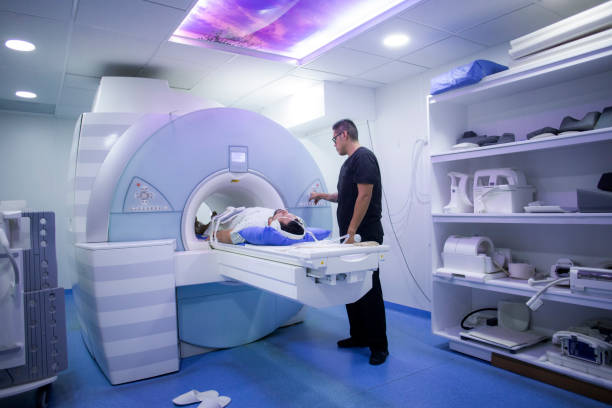
Magnetic Resonance Imaging (MRI) is a widely used and non-invasive diagnostic tool that allows doctors to look inside the body to assess the structure of organs, tissues, and bones. While most MRIs are straightforward, some individuals may experience unexpected symptoms after the procedure. One common concern is, Why do I feel drained after an MRI without contrast? This feeling of fatigue can be puzzling, especially since MRIs without contrast are typically less invasive than those involving contrast dyes.
In this article, we will explore several reasons why you might feel unusually drained after an MRI without contrast and offer some insights into how to recover from this fatigue.
Understanding MRI Without Contrast
An MRI without contrast involves using a magnetic field and radio waves to create detailed images of the inside of the body. The procedure does not require any injected substances to enhance the images, making it a less invasive option than an MRI with contrast. The absence of contrast dye means the scan simply relies on the body’s natural tissues to create clear images.
Possible Causes of Fatigue After an MRI
- Mental and Emotional Stress
One of the primary reasons individuals feel drained after an MRI is mental and emotional stress. The experience of being inside a confined MRI scanner can be overwhelming for some people, especially if they feel claustrophobic. The loud noise, the need to stay still for an extended period, and the unfamiliar environment can all contribute to stress.
Even if the procedure is routine, the anticipation of the scan or a feeling of uncertainty about results can lead to mental fatigue. The brain expends energy dealing with stress and anxiety, which can leave you feeling drained afterwards.
- Physical Discomfort
Though MRIs without contrast are non-invasive, they can still cause some discomfort. The process can take anywhere from 15 minutes to over an hour, during which you must remain still. Lying in one position for an extended period can cause muscle fatigue or soreness. This physical strain may contribute to feeling tired or drained after the procedure.
- Sensory Overload
The MRI machine is noisy, with loud banging and thumping sounds during the procedure. Some individuals find the constant noise disorienting or overwhelming. This sensory overload, coupled with the need to lie still, can cause the body to respond with fatigue after the procedure.
- Body’s Response to the Magnetic Field
MRIs use powerful magnetic fields to create images, and while the magnetic fields themselves are not harmful, they can have subtle effects on your body. Some individuals are more sensitive to these magnetic fields and may feel physically drained after the procedure. However, these effects are usually short-lived and not a cause for concern.
- Lack of Movement
During an MRI, you are typically instructed to remain still, which can be challenging for some people. Lack of movement, combined with the confinement of the MRI machine, may result in a feeling of restlessness or even mild discomfort. Afterwards, your body might feel fatigued from the immobility and the prolonged position.
- Pre-existing Conditions or Medications
If you have a pre-existing medical condition such as anxiety, chronic fatigue syndrome, fibromyalgia, or other health issues, you may be more susceptible to feeling drained after any medical procedure, including an MRI. Additionally, medications you are taking might also contribute to feelings of fatigue after an MRI. It’s essential to talk to your doctor about any concerns you may have, especially if fatigue persists beyond the usual recovery time.
- Poor Sleep Before the MRI
If you didn’t sleep well the night before your MRI, it’s not uncommon to feel tired after the procedure. Lack of sleep can exacerbate feelings of fatigue, and the added stress of the MRI could make you more aware of your tiredness.
When Should You Be Concerned?
While feeling drained after an MRI is generally normal and short-lived, it’s important to monitor how you feel afterwards. If the fatigue persists for several days or if you experience other symptoms such as dizziness, headaches, or significant discomfort, it’s advisable to consult your doctor. In rare cases, the fatigue may be a symptom of an underlying medical issue, such as a reaction to the procedure, or it could be related to the reason for the MRI itself.
How to Recover from MRI Fatigue
If you’re feeling drained after an MRI without contrast, here are a few tips to help you recover:
- Rest and Hydrate: Give your body time to recover by getting plenty of rest and drinking water to stay hydrated.
- Gentle Movement: If your body feels stiff or sore from lying still during the procedure, gentle stretching or a light walk may help relieve some of the discomfort.
- Relaxation Techniques: If the procedure causes emotional stress, relaxation techniques like deep breathing, meditation, or yoga can help calm your mind and restore energy.
- Nutrition: Eating a balanced meal or snack can help replenish your energy levels, especially if you’ve fasted or skipped meals before the MRI.
Conclusion
Feeling drained after an MRI without contrast is not uncommon and can be attributed to several factors, including mental and emotional stress, physical discomfort, and even the process of staying still for an extended period. This fatigue is usually temporary and can be alleviated with rest and self-care. However, if you notice persistent or severe symptoms, it’s always best to consult with your doctor for further evaluation and reassurance.





Leave a Reply